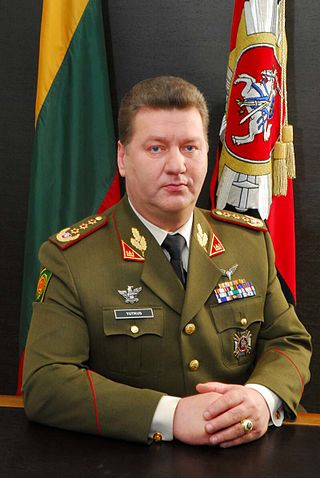
Lithuania is a European country located on the south-eastern shore of the Baltic Sea. It is a member of the United Nations, the Organisation for Security and Cooperation in Europe, the European Union, the North Atlantic Treaty Organisation and the World Trade Organisation. Currently, Lithuania maintains diplomatic relations with 186 states. It became a member of the United Nations on 18 September 1991, and is a signatory to a number of its organizations and other international agreements. It is also a member of the Organization for Security and Cooperation in Europe, NATO and its adjunct North Atlantic Coordinating Council, the Council of Europe, and the European Union. Lithuania gained membership in the World Trade Organization on 31 May 2001.

The Constitution of the Republic of Lithuania defines the legal foundation for all laws passed in the Republic of Lithuania. The first constitution of the contemporary republic was enacted on 1 August 1922. The current constitution was adopted in a referendum on 25 October 1992.
Lithuania does not recognise same-sex marriages or civil unions. A bill to legalise civil unions and grant same-sex couples some legal rights and benefits is pending in the Seimas. Lithuania is the only Baltic state to not recognise same-sex couples in any form. Additionally, the Constitution of Lithuania explicitly prohibits the recognition of same-sex marriages.

Lesbian, gay, bisexual, and transgender (LGBT) rights in Lithuania have evolved rapidly over the years, although LGBT people still face some legal challenges not experienced by non-LGBT residents. Both male and female expressions of same-sex sexual activity are legal in Lithuania, but neither civil same-sex partnership nor same-sex marriages are available, meaning that there is no legal recognition of same-sex couples - Lithuania is the only Baltic country to not recognize any same-sex unions.

Parliamentary elections were held in Lithuania on 10 October 2004, with a second round on 24 October 2004 in the constituencies where no candidate won a majority in the first round of voting. All 141 seats in the Seimas were up for election; 71 in single-seat constituencies elected by majority vote and the remaining 70 in a nationwide constituency based on proportional representation.

The Government of Lithuania, officially the Government of the Republic of Lithuania (GRL), is the cabinet of and exercising executive power in Lithuania. Among other responsibilities, it executes laws and resolutions of the parliament, the Seimas, and the decrees of the President, manages state property and, together with the president, executes the foreign policy of the country. The Government also has the right of legislative initiative, puts together the state budget and presents it to the Seimas for approval.
Juozas Karvelis was a Lithuanian politician. In 1990 he was among those who signed the Act of the Re-Establishment of the State of Lithuania.

The Sixth Seimas of Lithuania was the first parliament (Seimas) elected in Lithuania after it restored independence on 11 March 1990. Elections took place on 25 October 1992, with the second round on 15 November. In a surprisingly decisive outcome, the elections were won by Democratic Labour Party of Lithuania (LDDP), with 73 seats. The result reflected widespread dissatisfaction with the economic situation and the policies of the ruling Sąjūdis political movement in the preceding Supreme Council of Lithuania.

Rimantė Šalaševičiūtė is a Lithuanian politician and lawyer, ombudsman, and political and public figure.

The First Brazauskas Cabinet was the 12th cabinet of Lithuania since 1990. It consisted of the Prime Minister and 13 government ministers.

Remigijus Žemaitaitis is a Lithuanian far-right politician and member of the Seimas, known for his antisemitic extremism. He is the founder and leader of the political party Dawn of Nemunas.
The Mayor of Vilnius, officially the Mayor of the municipality of the city of Vilnius is the head of the Lithuanian municipality of the city of Vilnius. The current incumbent is Valdas Benkunskas, following the 2023 Vilnius mayor elections.
Jonas Jarutis is a Lithuanian politician, who from 2020 serves as Deputy Speaker of Seimas of Republic of Lithuania.

Lieutenant General Valdas Tutkus is a Lithuanian former military officer and politician. He served as the Chief of Defence of the Republic of Lithuania from 2004 until 2009, having previously served as an Armed Forces Commander from 2001 to 2004.

In Lithuania, a public election committee is an organized group of voters outside of political parties which participates in local or European Parliament elections.

The President of the Supreme Court of Lithuania is the President or chief justice of the Supreme Court of Lithuania. The president is regarded as one of two equivalent heads of judicial branch in Government of Lithuania. Another head is the president of the Constitutional Court of Lithuania. The current President of the Supreme Court of Lithuania is Incumbent Danguolė Bublienė.

The President of the Appeal Court of Lithuania is the chief justice of the Appeal Court. Serving as the presiding judge of a full bench composed of multiple judges, the president represents the Appeal Court of Lithuania. The current incumbent is Nerijus Meilutis who has been serving as President of the Appeal Court of Lithuania since 22 June 2021.

Nida Grunskienė is a Lithuanian jurist and legal expert who has been serving as the Prosecutor General of Lithuania since 14 January 2021. She also served as the Chief Prosecutor of the Panevėžys Regional Prosecutor’s Office from 2013 to 2021, where she gained extensive experience in handling criminal cases, particularly in the areas of organized crime and corruption.

The Prosecutor General of Lithuania is the chief and head of the Prosecutor General's Office of Lithuania and is the highest-ranking official within the Lithuanian prosecutorial system. The current incumbent is Nida Grunskienė.













